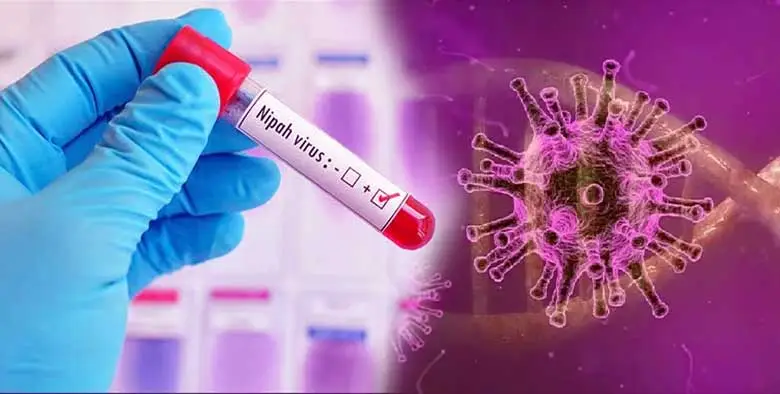- Know Everything About Nipah Virus, Which Is Back In Kerala Again
- Kevin Porter Jr Arrested On His Girlfriend’s Assault Charge
- Market Change Overnight - Know The 8 Things That Did It
- Who Are Alba Baptista And Chris Evans Married On The Weekend?
- Disrupted India vs Pakistan Asia Cup 2023 Match on Reserve Day
- 10 Common Foods That Contain No Calories or Are Very Low in Calories
- Men’s Styling Tips - Know the 9 Common Style Mistakes to Avoid
- Coco Gauff Beats Karoline Muchova and Reaches the US Open Final
- Danny Masterson Gets Life Sentence of 30 Years for Two Rapes
- Experience A Splendid Vacation in Kashmir with These 15 Gorgeous Sights
- India
- Saturday , July 27, 2024
- Last Published Sep 12, 2023, 6:48:32 PM

Know Everything About Nipah Virus, Which Is Back In Kerala Again
Two unnatural deaths in Kozhikode District of Kerala, the Southern state of India, made an alarm for the state health department. The deaths are suspected of Nipah virus. Doctors along with health authorities sent the samples to the National Institute of Virology (NIV) in Pune.
After attending a high level meeting with health experts, Veena George, the state health minister, said to media persons, “At this moment, we have taken all the precautionary steps based on suspicion that the death may be due to Nipah virus. We have conducted preliminary tests here. But it can be confirmed only after the samples are tested at Pune NIV”.
The first unnatural death was reported on the 30th of August and another on Monday, 11 September this year. On the current situation, health officials said, “All health systems in the district are on alert. Orders have been issued to isolate the close contacts of the deceased persons. Result will be reached by this evening and Nipah virus infection can be confirmed after that only”. Further, they added, “If the results are positive, action will be taken according to the state Nipah protocols. A comprehensive assessment will be done.”
Before the current suspected outbreak, Nipah virus made news in Kerala and across the country. The first report of this virus came out in 2018 when two districts, Malappuram and Kozhikode, of Kerala reported a few unnatural deaths. In 2021, one case was also reported from Kozhikode. After sample testing, the state health department made it clear that all deaths in 2018 and 2021 were due to Nipah Virus. Let’s know everything about it such as what Nipah virus is, what symptoms of Nipah are, and how you can protect yourself from Nipah virus.
What is Nipah Virus?
As a zoonotic virus, Nipah virus spreads from animals to humans. It can spread through contaminated food or contact with infected persons. If it occurs, it makes an infected person have subclinical infection to fatal encephalitis and acute respiratory illness. There were a few outbreaks of the Nipah virus in the past, it can make several animals ill and cause death to humans.According to the WHO, the Nipah virus spreads to humans from animals like pigs and bats and has an estimated fatality rate of 40% to 75%. The fatality percentage varies from one geographical location to another. The ideal abode of the Nipah virus is fruit bats of the Pteropodidae.
Origin of the Nipah Virus
It was 1999 when Malaysia reported a new infection in pig farmers. After that, Malaysia has not seen another outbreak of this virus. Since 2001, the outbreak of the Nipah virus has been an annual occurrence in Bangladesh. And since 2018, it is a common outbreak in Kerala, the Southern Indian state. The World Health Organization states that Pteropus bat species are ideal home of this virus, and the area where such bats live are at a higher risk of Nipah virus infection. Several other bat species found in Ghana, Thailand, Cambodia, the Philippines, and Indonesia also cause the outbreak of this virus.Nipah Virus Transmission
Nipah virus transmission occurs due to direct contact between animals and humans, especially sick animals like pigs. In subsequent outbreaks in India and Bangladesh disclosed that eating contaminated foods, fruits, or fruit products can cause Nipah virus outbreaks. As per the available studies, contact with an infected person can make other people have Nipah virus infection, especially among family members.Nipah Virus Symptoms
Usually, early infections are asymptomatic. However, as an infected person, you can experience the following signs and symptoms:• Fever
• Headache
• Muscle pain
• Sore throat
• Vomiting
• Dizziness
• Drowsiness
• Altered consciousness
• Chronic respiratory problems
• Atypical pneumonia
Seizures and encephalitis in severe cases can lead an infected person to coma within 24-48 hours of infection. If not cared well earlier, death is common for infected people, as it has 40-75% fatality rates.
Nipah Virus Diagnosis
Initially, your doctor cannot prescribe any tests if you suspect of having the Nipah virus infection. However, the doctor can request you to have an RT-PCR test (real time polymerase chain reaction). Further, your doctor can ask you for PCR and virus isolation through cell culture.Nipah Virus Treatment
As per the current clinical study results and renowned health experts, there are no medicines, vaccines to treat patients with the Nipah virus infection. The WHO has recognized this viral infection and is working with health experts across the world to make this viral infection treatable to save the infected persons’ life.Nipah Virus Prevention
Usually, the outbreaks of Nipah virus are common in animals like pigs, horses, cats, sheep, dogs, goats. Its outbreaks in humans occur due to the direct contact with pets. So, to protect yourself from this viral infection, you need to• Keep your pet’s home clean all the time
• Avoid going close to an infected animal or person if you suspect its outbreaks in your locality
• Stay away from eating contaminated foods, fruits, and fruit products
• Wear protective gears like gloves and masks well before being close to a sick animal or person
• Maintain a safe distance from an infected person
Disclaimer - The texts with tips or advice mentioned here are only for generic information, but not for a substitute of medical advice. Before applying any advice or tips, you should consult a respective doctor or expert. ATT is not responsible if you have any bad impacts on your health.












